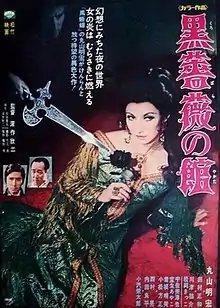Black Rose Mansion
Black Rose Mansion (黒薔薇の館, Kuro bara no yakata) is a 1969 Japanese drama film directed by Kinji Fukasaku.[1][2][3][4][5]
| Black Rose Mansion | |
|---|---|
 | |
| Directed by | Kinji Fukasaku |
| Produced by | Akira Oda |
| Based on | A play by Yukio Mishima |
| Music by | Hajime Kaburagi |
| Cinematography | Takashi Kawamata |
Release date | 1969 |
Running time | 90 minutes |
| Country | Japan |
| Language | Japanese |
Cast
- Akihiro Miwa as Ryuko Fujio
- Eitaro Ozawa as Kyohei Sako
- Masakazu Tamura as Wataru
- Ayako Hosho as Kyohei's Wife
- Kō Nishimura
- Kikko Matsuoka
- Ryohei Uchida
Other credits
- Art direction: Kumagai Masao
- Written by:
- Kinji Fukasaku
- Hirō Matsuda
- Yukio Mishima - play
Reception
Hayley Scanlon of windowsonworlds.com wrote that Black Rose Mansion is "drenched in gothic melodrama" but "also succeeds in being both fascinatingly intriguing and a whole lot of strange fun at the same time."[6]
In the book Rising Sun, Divided Land: Japanese and South Korean Filmmakers, author Kate E. Taylor-Jones writes, "In his use of people and characters that deliberately challenge the dominant ideology of attempting to 'forget' the war, Fukasaku is a fore-runner of later directors such as Miike Takashi who would also use non-Japanese characters to make comments on the state of Japanese society."[7]
References
- "黒薔薇の館". wowow. Retrieved 28 December 2020.
- "黒薔薇の館". 松竹. Retrieved 28 December 2020.
- "Black Rose Mansion". Agency for Cultural Affairs 映画情報システム. Retrieved 2 November 2019.
- "黒薔薇の館とは". kotobank. Retrieved 2 November 2019.
- "黒薔薇の館とは". Kinema Junpo. Retrieved 2 November 2019.
- Scanlon, Hayley (January 18, 2016). "Black Rose Mansion (黒薔薇の館, Kinji Fukasaku, 1969)".
- Taylor-Jones, Kate E. (July 16, 2013). "Rising Sun, Divided Land: Japanese and South Korean Filmmakers". Columbia University Press – via Google Books.
External links
This article is issued from Wikipedia. The text is licensed under Creative Commons - Attribution - Sharealike. Additional terms may apply for the media files.